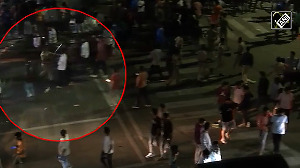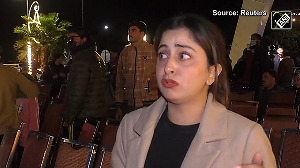Police investigators said Monday that they were searching for six Pakistani men as the probe into the weekend's terrorist attack at a Red Sea resort widened.
Police are circulating photographs of the six at checkpoints in and around this southern Sinai resort city. An Associated Press correspondent who saw the images said the men appeared to be between the ages of 20 and 30.
The involvement of Pakistanis in the attack in Sharm el-Sheik would be unprecedented, as non-Egyptians have rarely been linked to attacks here.
It would also be extremely difficult for a group of young Pakistanis not to be noticed in Sharm, one of the heaviest policed cities in Egypt and a favorite place of residence for President Hosni Mubarak.
Pakistani officials had no immediate comment.
The investigators, who spoke only on condition of anonymity because of the sensitivity of the inquiry, said they are looking into whether the six men had any involvement in carrying out Saturday's attack, Egypt's deadliest ever.
Police are to conduct DNA testing on the remains of a suicide bomber found in a car that rammed into the Ghazala Gardens Hotel in Naama Bay, the city's main tourist area, early Saturday.
Two other blasts rocked a car park near the hotel and an area about two miles away called the Old Market.
According to local hospitals, Saturday's pre-dawn bombings killed at least 88 people; Egypt's Health Ministry put the death toll at 64. Hospitals said the ministry count does not include a number of sets of body parts. At least one American was killed.
If independently confirmed, any involvement of Pakistanis would suggest that those behind Saturday's bombings belong to a much wider terror network than previously thought.
Until the latest news broke Monday, suspicions had primarily focused on a Sinai-based network thought responsible for bombings in the area last October that also targeted tourist sites.
The involvement of the Pakistanis, if proven, would also increase suspicions that Osama bin Laden's al-Qaeda may have been involved in the attacks. The Saudi-born bin Laden is popular among militant Pakistani groups and is known to enjoy support in tribal areas close to the Afghan border.
On Sunday, security officials said the bombers appeared to have entered Sharm in two pickup trucks loaded with explosives hidden under vegetables and that police were searching for three suspects believed to have survived the bombings.
It was unclear if police were linking those three in any way to the six Pakistanis being sought.
Before the attacks, the militants rubbed serial numbers off the trucks' engines, the officials said. Such serial numbers had been a key clue Egyptian investigators had used to track down those behind similar vehicle bombings last October against two resorts further north in the Sinai Peninsula, Taba and Ras Shitan.
One official said he believed the man who planted the suitcase came separately, not in the attack truck, and he said police were looking for more than three people, though he would not elaborate.
Investigators were also examining whether the suicide bomber who set off the blast at the Ghazala was one of five suspects still at large from the October attacks that killed 34 people.
Police took DNA samples from the parents of the five Taba suspects to compare with bodies found at the Ghazala, a police official said in el-Arish, where the parents were briefly detained.
Egyptian authorities portrayed the Taba bombings as an extension of the Israeli-Palestinian conflict, rather than a homegrown Islamic militant movement or an al-Qaida-linked operation.
They said a Palestinian who died in the attacks had recruited Bedouins and Egyptians to plot the bombings.
But the sophistication of the Sharm bombings -- and their timing on the heels of two rounds of explosions in London -- raised worries of a wider international connection and possible al-Qaeda links.






 © 2025
© 2025